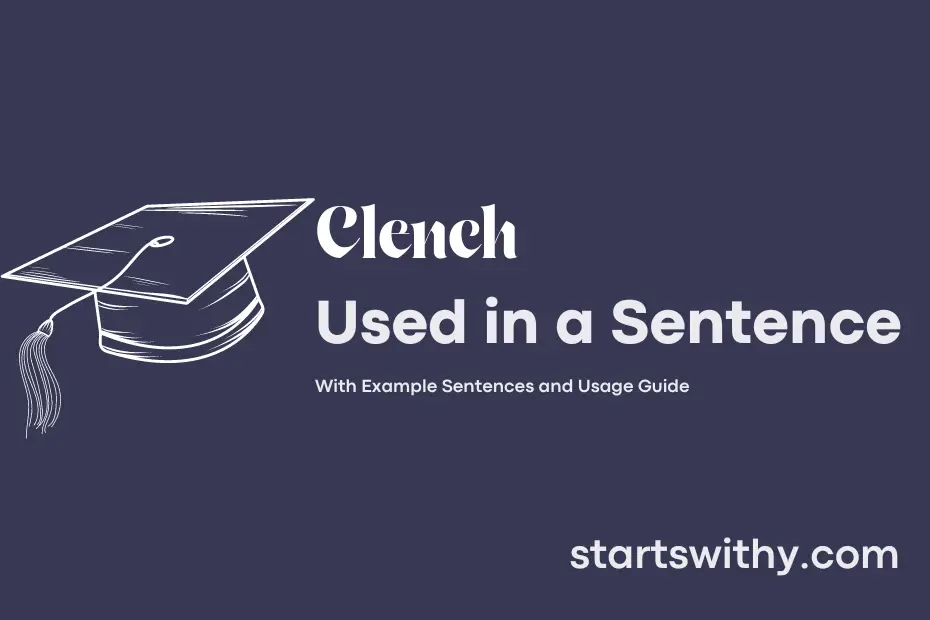Have you ever felt the tension in your muscles as you clench your fists in frustration or anxiety? “Clench” refers to the action of squeezing or tightening a part of the body, often in response to strong emotions or physical discomfort.
This simple yet powerful gesture can communicate feelings of anger, determination, or fear without uttering a single word. Understanding how to use “clench” effectively in writing can add depth and emotion to your descriptions and dialogue.
7 Examples Of Clench Used In a Sentence For Kids
- Clench your fists tightly!
- Don’t forget to clench your teeth when angry.
- Give a big yawn and then clench your jaw.
- When angry, take a deep breath and clench your fists.
- Clench your hands before opening them wide.
- Try to clench your teeth and count to ten.
- After stretching, clench your fingers and release.
14 Sentences with Clench Examples
- It’s important to clench a pen tightly while writing fast during exams.
- Before giving a presentation, take a deep breath and clench your fists to boost confidence.
- When feeling stressed before an exam, try to clench and release your jaw to relax facial muscles.
- To improve focus while studying, try clenching your abdominal muscles for a few seconds.
- Clench your teeth gently to reduce anxiety during a challenging assignment.
- While doing yoga or meditation, remember to clench and release your muscles to release tension.
- Before a sports match, athletes often clench their fists to psych themselves up for the game.
- After a long day of classes, clench your fists and release to relieve pent-up stress.
- To stay awake during late-night study sessions, stand up and clench your fists for a quick energy boost.
- When feeling overwhelmed with assignments, practice clenching and relaxing your muscles to release tension.
- Clench your jaw lightly to regulate breathing and calm nerves before a difficult presentation.
- For a quick mental refresher during study breaks, stand up and clench your hands to increase circulation.
- Before a crucial exam, take a moment to clench and release your shoulders to ease any tension.
- When feeling frustrated with coursework, try clenching your fists and then opening them to let go of negative energy.
How To Use Clench in Sentences?
To use the word Clench in a sentence, remember that it means to grip or squeeze tightly, often in a show of anger, determination, or pain. Here are a few ways you can incorporate Clench into your writing:
-
Anger: “She could feel her fists clench at her sides as she tried to control her temper.”
-
Determination: “Despite the pain shooting up her leg, she clenched her teeth and kept running towards the finish line.”
-
Fear: “His heart clenched with fear as he heard a noise in the dark shadows behind him.”
-
Physical sensation: “The cold wind made her clench her scarf tightly around her neck.”
Remember to pay attention to the context of your sentence when using Clench, as it often conveys a strong emotion or physical action. Be mindful of the intensity you want to convey and choose your words carefully to create a powerful image or feeling for your readers. Practice using the word in different scenarios to become more comfortable incorporating it into your writing.
Conclusion
In conclusion, the use of sentences with “clench” can effectively convey emotions of tension, determination, or resistance. By describing someone’s jaw tightening in a moment of anger or fists clenching in frustration, these sentences can paint a vivid picture of intense emotions. The repetitive use of “clench” in sentences can signify a physical or emotional struggle, adding depth and intensity to the narrative.
Whether depicting a character’s inner turmoil or a gripping moment of conflict, sentences with “clench” pack a punch in evoking strong emotions and building suspense. Writers can harness the power of this word to create impactful scenes that keep readers engaged and emotionally invested in the story.



